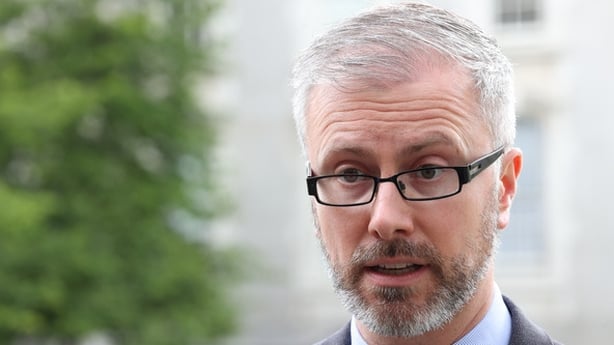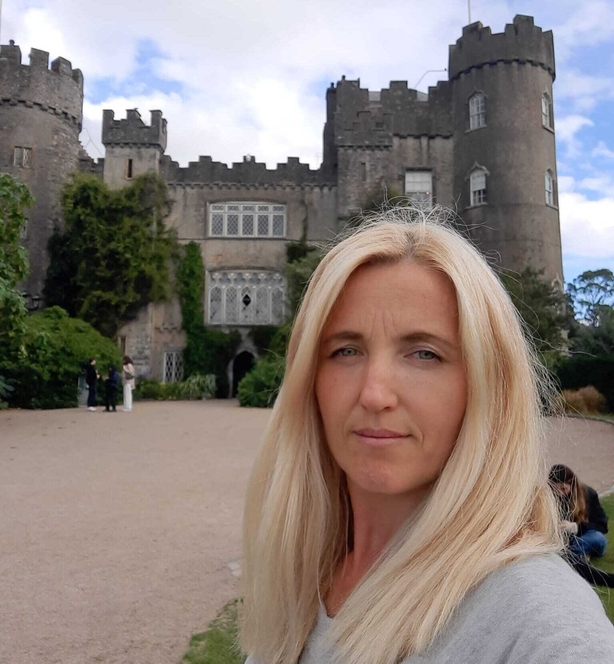Ministers have been keen to downplay the Cabinet row over proposals to tighten up the so-called "offering" provided to Ukrainians arriving in Ireland.
Various accounts of the Cabinet meeting described Tánaiste Mícheál Martin and Minister O'Gorman as being "agitated" during the discussion which followed a briefing by the latter, which wasn’t on the Cabinet agenda.
But in the intervening days, Coalition party leaders and their representatives have insisted such reports are wide of the mark.
Taoiseach Leo Varadkar told the Dáil that "rows in Government are much exaggerated", when it was put to him by Aontú leader Peadar Tóibín that the disagreement at Cabinet was "more about shifting the issue... from one department to another", specifically from the Department of Children to the Department of Housing, and so from the "Green Party to Fianna Fáil".
While the Tánaiste said it was a "bit exaggerated to say there was a row. I think there have been many challenging issues that have come before us".
What is clear, is that the topic is firmly on the political agenda, and the Government is examining the supports being provided to Ukrainians - including the amount of social welfare they receive.

Of course, comparisons are difficult because the cost of living varies significantly across the EU.
But Ukrainians arriving here get the standard Jobseekers Allowance of €220 per week, which is more than twice that given in Spain (€100) and the UK (€95) – which while not in the EU has perhaps a more comparable cost of living to Ireland.
Furthermore, there has been an increase in the number of Ukrainians travelling to Ireland from another EU country.
According to a spokesperson for the Department of Justice: "An examination of data collated between Member States indicates that 1 in 3 recent applicants for Temporary Protection in Ireland have previously registered for Temporary Protection elsewhere.
"As data collection methods may vary across Member states, this figure is not definitive, and would include persons who were briefly registered in another Member State before travelling to Ireland (there being no direct route)."
One source said the Government had to examine ways of making the costs associated with supporting Ukrainians more sustainable.
They said that we had to move away from an emergency response to one which is more long term.
Several areas are under consideration, not just accommodation, but also education and welfare supports.
Status quo cannot continue - Harris
That sentiment was echoed by Minister for Higher Education Simon Harris who said the status quo on the level of support provided to Ukrainians simply cannot continue.
"We have to be supportive of Ukraine, but we also have to look at the entire package that we can provide to make sure it is sustainable because we want to be able to continue to support," he said.
He said Ireland was one of the last EU countries to examine its offering to those arriving here.
Mr Harris added that Minister O'Gorman was "quite rightly" highlighting a real issue to colleagues that must be grappled with and the responsible thing to do is to await formal proposals.
Government sources are not explicit in saying they want the new proposals to act as a deterrent, but they do not want the message out there that Ireland is more attractive than other European countries.
Ireland has played its part - hotelier
Hotelier Lorraine Sweeney, who has hosted Ukrainians since the very start of Russia’s invasion of Ukraine in February 2022, has long believed the social welfare being offered is too generous.
She also believes it provides a disincentive to work, saying she’s seen it among her own Ukrainian guests.
She said: "They'll work up to 19 hours a week but not more – many of them have the skills to work full-time but won’t because they’d lose their benefits."
She believes the 90-day limit is completely unworkable, asking where would they go after that period?
Ms Sweeney said she believes the Government is trying to "put people off [coming to Ireland]".
She said the word is out among the Ukrainian community abroad that Ireland is very attractive, and the fact it is English-speaking is a bonus.
She said rather than just tweak the system, they should "shut the door".
It is not a sentiment you would associate with someone who has been so supportive of Ukrainians fleeing the war.
But Ms Sweeney said she is simply being practical, saying Ireland has played its part.
But what about Ukrainians living in Ireland, how do they feel?

Halyna Kovalchuk was among the first cohort of Ukrainians to arrive in Ireland in March 2022 in the weeks after Russia invaded Ukraine.
She said they were "in a state of complete confusion" and had no idea how long they had be in Ireland.
After five months, the family of six tried to find their own housing but could not find anything they could afford.
Furthermore, two of her three children are in a "wonderful" local school.
She said another move would re-traumatise them, after having made such good friendships.
Asked about the benefits offered to Ukrainians, Ms Kovalchuk said she now works full time so no longer receives Jobseekers Allowance.
She said the social welfare rate is "very generous", and very much appreciated when settling in.
But she said she "knows cases when people do not see [the] financial motivation to go to work [because of the rates paid.] However, it is fair to note that this applies not only to representatives of the Ukrainian community."
"I personally know five families who left Ireland because they thought it would be easier for them to rent in other countries.
She is equally pragmatic when asked about Ukrainians coming to Ireland after first seeking protection in another EU country, saying some move because English is the only other language they know, so it is easier to get a job and socialise here [or in the UK].
She added: "However, I am well aware that there is a certain percentage of people who choose Ireland because of the generous social welfare."
Ivanna Ibragimova makes a similar argument that Ukrainians are not one homogenous group and come to Ireland for different reasons.
But, she said: "The majority of people are coming because of the war. And war is not only the real-life risks because of bombing - which is the case for all Ukraine, as no one knows where they will send missiles", but also the economic risk and the loss of employment opportunities.
'Overcrowded' accommodation
Ms Ibragimova points to the fact that some accommodation is overcrowded.
She added: "I know people who are staying in [one small room], two different families, with children of different ages and genders. They are still there. If there [weren't risks at home], why would they tolerate [these] conditions?"
She believes the current decision to provide accommodation for a maximum of 90 days "will just postpone the problems for Ireland",
Ms Kovalchuk said some Ukrainians are leaving Ireland because it's impossible to find accommodation in the private sector.
She said: "I personally know five families who left Ireland because they thought it would be easier for them to rent in other countries.
"I agree that in order to...motivate people to develop, adapt faster and find a job, the provision of social welfare could be regulated."
Next week the Government is expected to return to this issue. Ministers know it will be a difficult decision.







